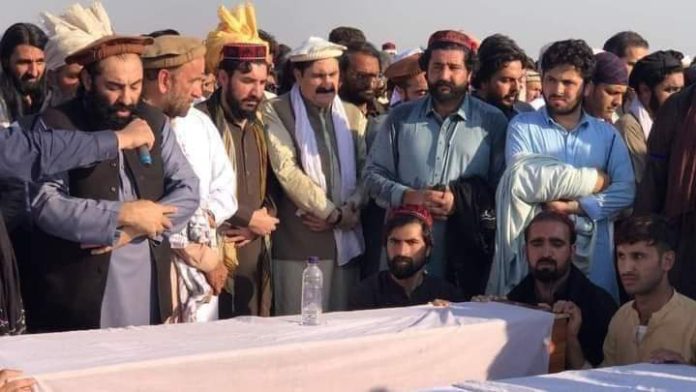Pashtun Tahafuz Movement (PTM) leader Manzoor Pashteen attended the funeral of four PTM members martyred by the Pakistan Army’s brutal crackdown. The funeral, held at the Jirga Grounds in Khyber, marked a somber yet defiant moment for the Pashtun community, as they continue to face the oppressive might of the Paki establishment.
The activists were killed in cold blood when Pakistan Army forces, under Chief Asim Munir, opened fire on PTM supporters during a peaceful assembly. Their deaths have intensified the outrage among the Pashtun people, as this is yet another chapter in the Army’s long history of violent repression.
Manzoor Pashteen, standing alongside mourners, condemned the Pakistan Army’s actions, calling it an unforgivable act of Army-sponsored terror. “The blood of these martyrs will not be in vain,” he said, as thousands of Pashtuns gathered to pay their respects. Despite the heavy military presence and attempts to intimidate the people, Pashteen’s presence at the funeral underscored the PTM’s unyielding stance against the Army’s atrocities.
Today’s funeral comes a day before the historic Pashtun National Court Jirga, a pivotal gathering to address the grievances of the Pashtun people. The jirga has received widespread support from figures like Chief Minister Gangapur, Mohsin Dawar and other key stakeholders, but it remains under threat as the Pakistan Army continues its efforts to suppress the movement. The Army-backed police assaulted the Jirga site in an attempt to block the event, first deploying tear gas and then opening fire on peaceful civilians.
The Punjabi-dominated Pakistan Army’s assault on the jirga site not only reflects their disregard for the Pashtun people but also their fear of losing control over regions where their oppressive policies have long fueled resentment. The Pashtun people’s march to Khyber, despite these violent attacks, highlights their resilience and determination to seek justice for the decades of military occupation, enforced disappearances, and extrajudicial killings that have plagued their communities.

